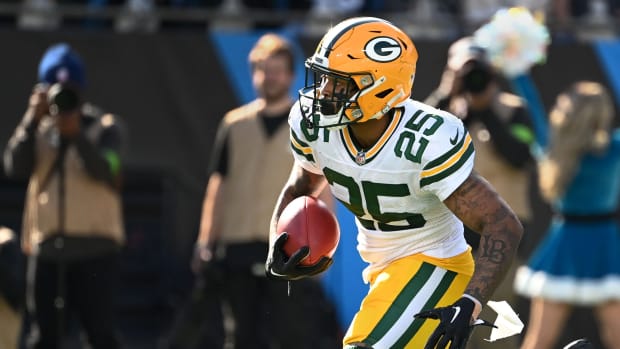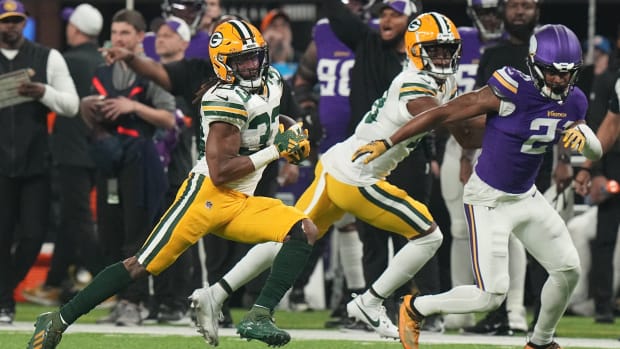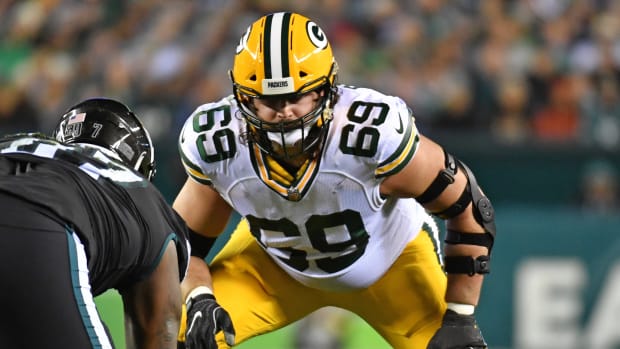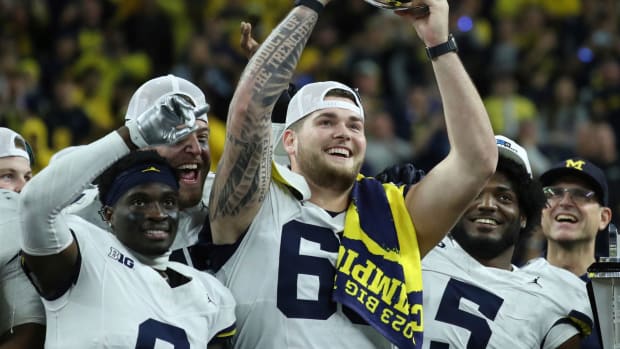Scouting Combine Receivers: Hardship Drove Ruggs, Shenault
Part 6 of our six-part preview includes Alabama’s Henry Ruggs, Colorado’s Laviska Shenault Jr., an elite kick returner and the son of an NFL player.
Joe Reed, Virginia (6-0, 193): Reed caught 52 passes in his first three seasons but 77 passes for 679 yards (8.8 average) and seven touchdowns as a senior. Don’t let that meager average suggest he’s not explosive. He was a huge threat on kickoff returns with career marks of 28.7 yards per run back and five touchdowns. As a senior, he was a first-team All-American with a 33.2-yard average and a pair of scores. He is the only player in FBS history with 2,700-plus career kick return yards and a career kick return average of 28-plus yards. As a junior, he averaged 18.6 yards per catch with seven touchdowns on 25 catches. His four-year totals were 129 receptions for 1,465 yards and 16 touchdowns.
Reed’s explosiveness on returns gave him a bit of a green light. His father was a train engineer. “That was my favorite part of growing up – riding the train with my dad,” Reed told the school Web site. “I always liked the view.” As part of that Q&A, he discussed his favorite hobby: frog gigging. My friends and I would always do it. We would always walk around the banks. When the sun goes down, there’s not much else to do, so we would be like, ‘Hey, let’s go catch some frogs.’ We’d skin ’em and cook ’em the next morning. They are really good.”
Kendrick Rogers, Texas A&M* (6-4, 204): Rogers caught 68 passes for 786 yards and seven touchdowns in three seasons, including career highs of 30 catches for 351 yards in 2019.
Rogers is an imposing target without imposing production. “You gotta keep staying with [Rogers],” coach Jimbo Fisher said in October. “We know what his potential is to do. But at the end of the day, there’s gotta be a point where, like we tell him, we can only stay with you so long. You gotta start getting results in play and he did that and hopefully he’ll continue to do that.” From a yardage standpoint, two of his three biggest games were against Clemson, including seven catches for 120 yards and two touchdowns – all career-best totals – in 2018. At Frankston (Texas) High School, he was a two-way football star, basketball standout and state qualifier in the 200 meters. His mom overcame hard times, a lesson that transferred down to her son.
Henry Ruggs, Alabama* (6-0, 190): In three seasons, Ruggs caught 98 passes for 1,716 yards and 24 touchdowns. In 2019, when he caught 40 passes for 746 yards and seven touchdowns, he had an 81-yard catch and a 75-yard run and averaged 18.7 yards per catch. He also produced on kickoff returns and on the kick-coverage units.
Ruggs is pushed by the memory of Rod Scott. Scott was his best friend at Robert E. Lee High School in Montgomery, Ala., and they starred on the basketball team. In March 2016, Scott was involved in a car accident and died. Ruggs was sick that day and wonders if life would have been different had he been healthy and behind the wheel. “Most of the time, if I was with him, he’d let me drive. I probably would’ve been the one driving, so there’s no telling (what could’ve happened. You know, everything happens for a reason, but you never know. If I was driving, maybe it would’ve been both of us, but you just think about what other kind of situations could’ve went on or would’ve went on if I had never gotten sick.” The death hit him incredibly hard. He’d disappear to the cemetery or retreat to his bedroom for hours at a time. “Who am I going to talk to?” Ruggs said. “Rod was it. I didn't have another friend like that. Rod knew things my brother didn't know. Things my parents didn't even know. I didn't even tell my family how many scholarship offers I had, but Rod knew it was 23.” At Robert E. Lee High School in Montgomery, Ala., he set the state meet record in the 100 meters. He set an Alabama football record by reaching 23.27 mph on a screen that he took 84 yards for a touchdown. That’s barely slower than Usain Bolt. His brother is at East Mississippi Community College, trying to resurrect his college career at what’s more commonly known as “Last Chance U.”
Laviska Shenault, Colorado* (6-2, 220): In three seasons, he caught 149 passes for 1,943 yards and 10 touchdowns and added 280 rushing yards and seven more scores. In 2018, he led the nation in receptions per game (9.6), finished the year with 86 catches for 1,011 yards and six touchdowns and was the only player in the nation with at least five touchdowns receiving and rushing. In 2019, he caught 56 passes for 764 yards and four touchdowns.
His father died when he was 10, struck by multiple vehicles when he slipped on the shoulder of a highway. It was a horrendous scene witnessed by his wife and their five children. "It swiped him and spun him around, and he was starting to get up," Annie Shenault. "I tried to get out of the car and my door wouldn't open; I was grabbing at the handle so fast. By the time he started to stand, this truck comes and hit him straight on -- we saw him on the hood. It almost caused a big pile-up. You [remember] it in slow-motion. Big trucks were swerving, an SUV spun around when they saw him in the road.” Shenault and his dad spent countless hours playing “Madden,” then practiced the moves from the game. “I’m pretty sure he’s proud of me,” he told the Denver Post. He keeps his hair long to honor his father, who didn’t cut his hair. Growing up in DeSoto, Texas, Shenault started his football career on the lowest-level freshman team. Now, he’s a role model. “It’s a tool that we use for kids now that are on the B team. Now I can say, ‘Laviska Shenault was on the Heisman watch list and he was on the freshman-B team,’” Bam Harrison, the B-team coach at the same, said. “It gives the kids hope, because when you’re put on the B team it’s like, ‘Oh, man, I’m the worst.’ Some take it hard, but some of them, like Laviska, take it and use it as a building block.”
Darrell Stewart, Michigan State (6-2, 216): Stewart was a picture of consistency, with 50 receptions as a sophomore, 48 as a junior and 49 as a senior. During his final season, he caught 49 passes for 697 yards (14.2 average) and four touchdowns. He finished his career with 150 receptions for 1,640 yards and seven touchdowns. Plus, he averaged 24.0 yards per kickoff return.
Stewart missed the final four regular-season games of his career with a broken leg but returned for the Pinstripe Bowl to catch two passes for 3 yards. “Still being able to get out there and affect people,” he said after the game. “Not being out there physically, but mentally, just making sure the younger guys are ready to go. It was an iffy situation, but I pulled through and believed in God and just had faith.” Stewart’s family was impacted twice by major flooding from storms, including Hurricane Harvey in 2017. “One thing I told the guys, I was like, ‘The main goal for me is going back and giving back to the city that gave a lot to me,'” he told the Detroit News. “Going back and seeing people going through devastating times, I just want to … make them happy and let them know that we’ve got hope. As long as you have faith in God, anything is possible.” He won the Doug Weaver “Oil Can” Award as team humorist his final three seasons.
Freddie Swain, Florida (6-0, 199): In four seasons, Swain caught 68 passes for 996 yards and 15 touchdowns. His best season came as a senior, when he caught 38 balls for 517 yards (13.6 average) and seven touchdowns. He averaged 7.9 yards with one touchdown as a punt returner. “We had to play him at a lot of different positions, at the receiver position, be involved in special teams and he’s embraced all of it,” coach Dan Mullen said.
In his free time, he likes to fix and personalize old cars. “Working on cars takes a little longer than most things, but when you get done with it, it’s kind of like all the hard work you put into it pays off,” Swain told the Athletic. “It’s sort of like football, you know what I’m saying? That’s kind of why I keep playing. You put a lot of hard work, blood, sweat and tears that people don’t see. But then when you bring the car out, and you got that paint on it and the interior is done — that’s the only thing they see. It looks nice. But you know, from the heart, what all you put into it and all the time you put into it and how it all paid off.”
Jeff Thomas, Miami* (5-10, 174): In three seasons, Thomas caught 83 passes for 1,316 yards (15.9 average) and eight touchdowns. His best season came in 2018, when he caught 35 balls for 563 yards (16.1 average) and three touchdowns. He added career marks of 22.6 yards per kickoff return and 18.9 yards with one touchdown on punt returns.
Thomas was booted off the team by former coach Mark Richt late in the 2018 season. "We have high standards for excellence, for conduct and for committment to team for all of the young men who wear our uniform, and we will not waiver from those standards," Richt said in the statement. "We wish Jeff the very best as he moves forward in his journey." Thomas did everything but enroll at Illinois before the new Hurricanes coach, Manny Diaz, consulted with the players and brought Thomas back aboard. Did Thomas believe he needed to change as a person? “Not really,” Thomas told BND.com, “but [I want to] pick people up, with the receivers, make sure everyone is doing what they’re supposed to be doing, on the same page and competing to the best of their ability.” Well, so much for that. Thomas was suspended for violating team rules and skipped the bowl game to focus on his entry into the NFL.
Binjimen Victor, Ohio State (6-4, 199): In four seasons, Victor caught 83 passes for 1,340 yards (16.1 average) and 18 touchdowns. His senior year was his best, with 35 catches, 573 yards (16.4 average) and six scores.
His physical tools are obvious. “He’s got that giant catch radius,” coach Ryan Day said. “He has, I think, a 7-foot wingspan, so when you’re a quarterback, you can kind of throw it anywhere in his vicinity and he’s got a chance.” What eluded him was consistency. That was the goal for his senior season. “I feel I had to grind harder,” Victor told the Columbus Dispatch. “That’s all they called me — potential, potential. It was all a grind, but it was all worth it.” Confidence was an issue early in his career. “He still doesn’t have the self confidence to play to his ability level, so he has to experience success,” his receivers coach told Rivals before Victor’s sophomore year. “He has to have small victories, he as to keep getting coached, keep getting grinded to the point where he goes out and feels like he is a dominant guy. When he is, he is going to be a dominant guy.”
Quez Watkins, Southern Mississippi* (6-2, 190): Watkins caught 159 passes for 2,404 yards (15.1 average) and 17 touchdowns in his three seasons. He set career highs with 72 receptions and nine touchdowns as a sophomore, then had 64 receptions for a career-high 1,178 yards (18.4 average) and six touchdowns as a junior even though he didn’t play the first two games of the season due to a suspension. He returned a punt for a touchdown as a sophomore.
His explosive final season almost didn’t happen. Between his sophomore and junior seasons, Watkins left Southern Miss and enrolled in a junior college to get his grades in order. Having accomplished that, he had to work his way back up the depth chart. “It kind of makes you appreciate the game more,” he told the Sun Herald. “I had to lead from the back. Even though I wasn’t a starter, I was still considered a team leader. I had to stay positive.”
Cody White, Michigan State* (6-3, 215): White’s three-year production was 143 receptions for 1,967 yards (13.8 average) and 12 touchdowns. His final season was his best with 66 grabs, 922 yards (14.0) and six scores.
His father is Sheldon White, a third-round pick by the Giants in 1988 who intercepted 11 passes in six NFL seasons. Sheldon White is MSU’s executive director of player personnel after working in the Detroit Lions’ front office for 19 years. “Ever since I was 6 years old, I guess you could say, being on the sideline with my dad,” Cody White told the Detroit News of his NFL decision. “This is a dream I’ve always had, and I feel like now I’m just ready to take that jump and make it a reality.” The two were always close, despite Sheldon’s demanding job. “Part of it came because my father became terminally ill at 42 and he passed away at 49, so these experiences that he’s having right now, I was not able to have as well,” Sheldon White told SI. “I just want to make sure that every day is a bonus, I’m 53 right now so every day I have right now is a bonus. I wanted to make sure that I spent the quality time that I have with Cody in every way and with all of my other kids as well.” At Walled Lake Western High School, the native of Novi, Mich., was the state’s Mr. Football winner after playing wide receiver, quarterback, running back, safety, cornerback, punter, kicker and returner.
Introducing the 55 Receivers
Part 1: Aiyuk, Bowden did it all
Part 2: Duvernay, Edwards and Gandy-Golden
Part 3: LSU's Jefferson among TD machines
Part 4: Lamb, Jeudy top receiver class
Part 6: Ruggs, Shenault produce big plays
Introducing the 30 Running Backs
Part 1 includes Cam Akers, Eno Benjamin and J.K. Dobbins
Part 2 includes Clyde Edwards-Helaire and Zack Moss
Part 3 includes D’Andre Swift and Jonathan Taylor
Introducing the 17 Quarterbacks
Part 1 includes Burrow, Eason, Fromm




